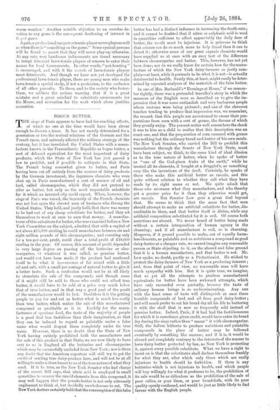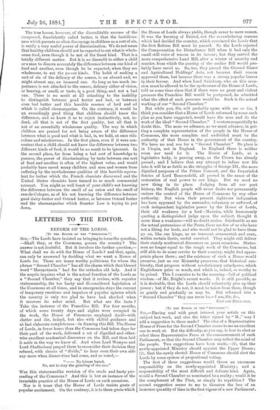BOGUS BUTTER.
THE siege of Paris appears to have had far-reaching effects, of which no one at the time would have been clever enough to discern a trace. It has not merely determined for a generation or two the mutual relations of the German and the- French races, and seriously affected the military strategy of the century, but it has inundated the United States with a manu- facture known in the Transatlantic Republic as bogus butter, a sort of debased equivalent for the most important of dairy products, which the State of New York has just passed a law to prohibit, and if possible to extirpate in that State. The French being somewhat given to butter, and Paris having been cut off entirely from the sources of dairy products by the German investment, the ingenious chemists who were shut up in Paris manufactured a sort of essence of oil and lard, called oleomargarine, which they did not pretend to offer as butter, but only as the most respectable substitute for it which an invested city could expect. When, however, the siege of Paris was raised, the ingenuity of the French chemists was not lost upon the shrewd men of business who throng the United States. They held, and justly held, that there was money to be had out of any cheap substitute for butter, and they set themselves to work at once to earn that money. A manufac- turer of this substitute for butter, who was examined before a New York Committee on the subject, admitted that with a capital of not above £15,000 sterling he could manufacture between six and eight million pounds of this oleomargarine ; and counting only for a ten-per-cent. profit, could clear a total profit of £48,000 sterling in the year. Of course, this amount of profit depended in very large degree on passing off the butterine or oleo- margarine, or whatever it was called, as genuine butter, and would not have been made, if the product had confessed itself to be what it is,—essence of fat mixed with a little oil and salt, with a small per-centage of natural butter to give it a better taste. Such a confession would not be at all likely to stimulate the sale of the compound; and though some of it might still be sold to those who could not afford true butter, it would have to be sold at a price very much below that of true butter, and in that way a good part of the profit of the manufacturer would be lost. Doubtless it is the getting people to pay for and eat as butter what is much less costly than true butter, which makes the sale of this manufactured compound so profitable as it is. Luckily for the manu- facturers of spurious food, the taste of the majority of .people is a good deal less fastidious than their imagination, so that they can be induced to regard as palatable under a false name what would disgust them completely under its true name. However, there is no doubt that the State of New York having entirely prohibited both the manufacture and the sale of this product in that State, we are now likely to have sent to us in England all the butterine and oleomargarine which may be successfully excluded from New York ; nor is there any doubt that the American exporters will still try to get the credit of sending true dairy-produce here, and will not be at all willing to make a clean breast to us of the true nature of what they send. If it be true, as the New York Senator who had charge of the recent Btll says, that nitric acid is employed in small quantities to remove the rancid elements from this compound, it may well happen that the pseudo-butter is not only extremely unpleasant to think of, but decidedly unwholesome to eat. The New York doctors certainly hold that the consumption of this false butter has had a distinct influence in increasing the death-rate ; and it cannot be doubted that if nitric or sulphuric acid is used in quantities sufficient to affect appreciably the daily dose of butter, the result must be injurious. It is grievous to think that science can do so much more to help fraud than it can to detect it; otherwise some of our great organic chemists would have supplied us at once with an easy test of the difference between oleomargarine and butter. This, however, has not yet been done ; nor do we really know for certain how far the manu- facture of which the New York dairy-farmers so justly com- plain—at least, while it pretends to be what it is not—is actually detrimental to health. Surely this, at least, might easily be deter- mined by repeated analyses of the materials of the false butter.
In one of Mrs. Barbanld's "Evenings at Home," if we remem- ber rightly, there was a pretended traveller's story in which the manners of the English were so described as to give the im- pression that it was some outlandish and very barbarous people whose customs were being pictured ; and one of the cleverest touches tending to produce that impression was, we remember, the remark that this people are accustomed to smear their pre- parations from corn with a sort of grease, the flavour of which they greatly enjoy. The present writer well remembers the shock it was to him as a child to realise that this description was an exact one, and that the preparation of corn smeared with grease was nothing but the ordinary bread-and-butter of his own meals. The New York Senator, who carried the Bill to prohibit this manufacture through the Senate of New York State, must have been subject, we think, to the same kind of ideal illusion as to the true nature of butter, when he spoke of butter as "one of the God-given fruits of the earth," while he treated all its elements, if bought at a druggist's, as something very like the inventions of the devil. Certainly, he speaks of those who make this artificial butter as rascals, and this quite without relation to whether they call what they have made by its right name or not. We quite admit that those who misname what they manufacture, and who thereby get a greater price for it than they otherwise would get, are rascals. But Senator Low goes a great deal beyond that. He seems to think that the mere fact that men should attempt to make an artificial substitute for butter, dis- creditable to them, and that butter itself is divine, while any artificial composition substituted for it is evil. Of course both assertions are absurd. We never heard of butter being made without a certain interposition of human agency in the churning ; and if all manufacture is evil, so is churning. Moreover, if it proved possible to make, out of equally harm- less elements, as palatable and as nutritious a compound as good dairy-butter at a cheaper rate, we cannot imagine any reasonable person or State objecting to it, on the absurd and false ground that it is a human manufacture, and that butter is not. Mr. Low spoke, no doubt, partly as a Protectionist. He wished to protect the dairy-farmers of New York as a producing interest ; and, from that point of view, no reasonable man will have much sympathy with him. But it is quite true, we imagine, that as yet all the attempts to produce manufactured equivalents for butter have been awkward attempts, which have only succeeded even partially, because the taste of ordinary human beings is so undiscriminating. Any one with the least sense of taste will distinguish at once these horrible compounds of lard and oil from good dairy-butter ; and will much prefer to eat his bread dry all his life to buttering it with the stuff that is now so frequently sold instead of genuine butter. Indeed, Paris, if it had bad the fastidiousness for which it is sometimes given credit, would have eaten its bread dry during the siege rather than" smear" it with oleomargarine. Still, the failure hitherto to produce nutritious and palatable compounds in the place of butter may be followed eventually by something like success; and if it is, it would be absurd and completely contrary to the interests of the masses to have dairy-butter protected by law, as New York is protecting it, against every possible substitute. What we have a right to insist on is that the substitutes shall declare themselves frankly for what they are, after which only those which are really injurious to health should be forbidden. If there is any butterine which is not injurious to health, and which people will buy willingly for what it professes to be, the prohibition of its sale would be as ridiculous as the prohibition of the sale of poor calico, or poor linen, or poor broadcloth, with its poor quality openly confessed, and would be just as little likely to find favour with the English people.
The true lesson, however, of the discreditable success of the compound, fraudulently called butter, is that the fastidious- ness which parents so often discourage in children as a sort of sin, is really a very useful power of discrimination. We do not mean that healthy children should not be expected to eat what is whole- some food, even though it be not of the finest kind. That is a totally different matter. But it is no discredit to either a child or a man to discern accurately the difference between one kind of food and another, even though he be expected, when they are wholesome, to eat the poorer kinds. The habit of making a sort of sin of the delicacy of the senses, is an absurd and, we might almost say, an immoral one. So long as too much im- portance is not attached to the senses, delicacy either of vision, or hearing, or smell, or taste, is a good thing, and not a bad one. There is no merit at all attaching to the inability to distinguish between good butter and bad, or between even bad butter and this horrible essence of lard and oil which is called oleomargarine. On the contrary, it would be an exceedingly good thing that children should know the difference, and so know it as to reject instinctively, not, in- deed, all that is not of the first quality, but all that is not of an essentially wholesome quality. The way in which children are praised for not being aware of the difference between what is good and what is bad, is, we hold, at once ridi- culous and mischievous. In the first place, even if it were con- venient that a child should not know the difference between two different kinds of food, it would be no merit to be ignorant. In the second place, far from being a bad sort of knowledge to possess, the power of discriminating by taste between one sort of food and another is often of the highest value, and would probably have saved many children and men and women from suffering by the unwholesome qualities of this horrible equiva- lent for butter which the French chemists discovered and the United States chemists have turned to so much commercial account. You might as well boast of your child's not knowing the difference between the smell of an onion and the smell of eau-de-Cologne, as of his not knowing the difference between. good dairy-butter and Ostend butter, or between Ostend butter and the oleomargarine which Senator Low is trying to put down.



































 Previous page
Previous page